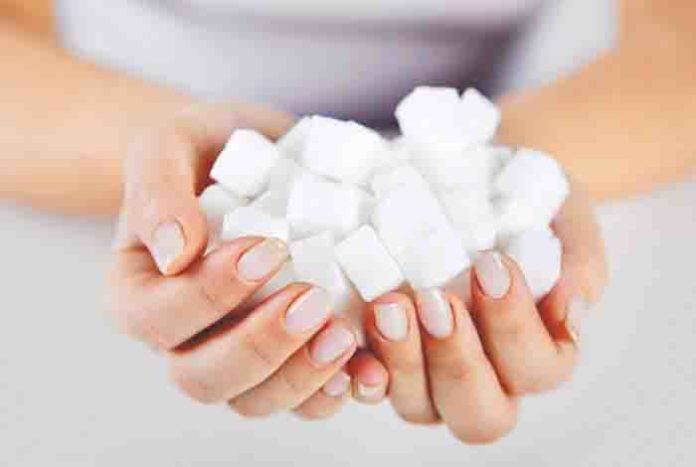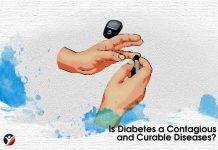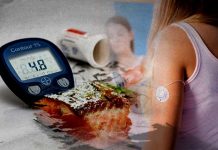
Blood sugar levels in people suffering from diabetes are higher than normal, so it is quite obvious to believe that sugar and other carbohydrates, somehow, trigger diabetes. But, various globally renowned diabetes organizations have a different opinion.
They consider this as a sheer myth. All these major diabetes associations have worked hard to educate people about all possible causes of diabetes and the role food plays in its progression. Let’s learn the truth behind such purported claims and beliefs.
Type-1 diabetes is an autoimmune disease, whereas type-2 diabetes is caused by pancreatic failure due to increased insulin resistance. Read on to know more about all this.
Sugar Is Our Body’s Fuel

Our body runs on glucose, much like our cars run on gasoline. Glucose sufficiently powers the brain, muscles and the rest of your body. Glucose comes from fruits and starchy foods like grapes, beans, grains and potatoes. While the body utilizes it when it is required, the fact is that it is impossible to survive without glucose.
Diabetes means that your blood sugar levels are significantly high and this could be due to one of the following reasons:
- Type-1 diabetes occurs when the body starts destroying its own insulin producing beta-cells usually through an autoimmune process. Viruses, dairy proteins and a few other factors might trigger this type of diabetes.
- Type-2 diabetes generally starts due to insulin resistance, which makes it difficult for glucose to reach body cells. This is primarily caused by the accumulation of fat in the liver cells and muscles. These fatty deposits are due to the consumption of fish fat, chicken fat, cheese fat and even vegetable fat. To overcome this insulin resistance, pancreas produce more insulin unless it can no longer cope with the condition. Pancreatic cells failure along with insulin resistance lead to the development of type-2 diabetes.
- During pregnancy, there might be abnormally high blood sugar levels, leading to gestational diabetes. Usually, the blood sugar levels become normal after delivery.
Diabetes Is On the Rise Despite Low Sugar Consumption
It has become quite a trend to blame sugar for most of the health issues. Statistically, per capita consumption of sugar has been on a decline in the U.S. since the year 1999.
The sugary beverages were gradually replaced with sugar-free beverages and bottled water. Simultaneously, the consumption of fattening oily and cheesy foods have skyrocketed. Along with it, the diabetes prevalence also increased to a greater extent. This clearly suggests that something else than sugar is triggering diabetes.
There have been quite many researches to study the association between diabetes and sugar consumption. A 2017 meta-analysis considered nine reports of 15 cohort studies comprising 251,261 participants. Surprisingly, researches found no considerable effect of total sugars on the risk of developing type-2 diabetes.
In fact, people, who consumed more sugar, had around 9% lower risk of developing diabetes as compared to those, who consumed the lesser amounts of sugar. However, the difference wasn’t statistically significant. Similarly, fructose consumption did not significantly increase a person’s diabetes risk. Moreover, it was found that sucrose apparently had a considerable protective association. People, who consumed more sucrose, had an overall 11% lesser risk of developing type 2 diabetes as compared to those, who consumed the least.
On the other hand, a 2015 meta-analysis, involving the analysis of 17 cohorts, revealed that after making adjustments to the body weight, a daily serving of 250 mL sugar-sweetened beverages increased the risk of developing diabetes by almost 13%.
According to various researches, it can be said that sugars are not explicitly associated with diabetes development, but sodas are. This is because sodas are generally consumed along with pizzas, cheeseburgers, nuggets and other high-fat, high-calorie foods. Other sugary snacks like pastries and cookies are also high in fat content. Sugar, somehow, lures us into consuming high fat foods.
Conclusion

We know that our body actually run on sugar; particularly, glucose. Sugar has only 4 calories per gram unlike fat that has almost 9 calories each gram. So, does that mean added sugar is safe? Certainly not! Though the body needs sugar for all its energy needs, it is not at all necessary to consume added sugars.
As sugar gets easily dissolved in snack foods and sodas, you might consume surprisingly large quantities without even realizing. These added sugars might contribute to weight gain, making you more prone to develop diabetes.
The roots of diabetes development lie in pancreatic cells failure, autoimmune causes and insulin resistance, but this can possibly worsen due to your overall dietary choices. Diets emphasizing mainly on dairy products, meats, fattening foods along with sugary beverages, foods and snacks, might really make you diabetic sooner or later rather than sugar alone.
So, make sure to consume diets that have whole grains, fruits, vegetables and legumes. Avoid consuming animal products to prevent or manage diabetes efficiently.
A largely perceived notion – “eating sugar causes diabetes” – is very much inaccurate. Nonetheless, you must avoid added sugars and adhere to a healthier plant-based diet.
Now, next time someone asks you “Sugar?” while you are out for a coffee, you can safely answer “Yes! Please.” However, we still advise you to not go overboard with it and choose foods that are rich in natural sugar.










